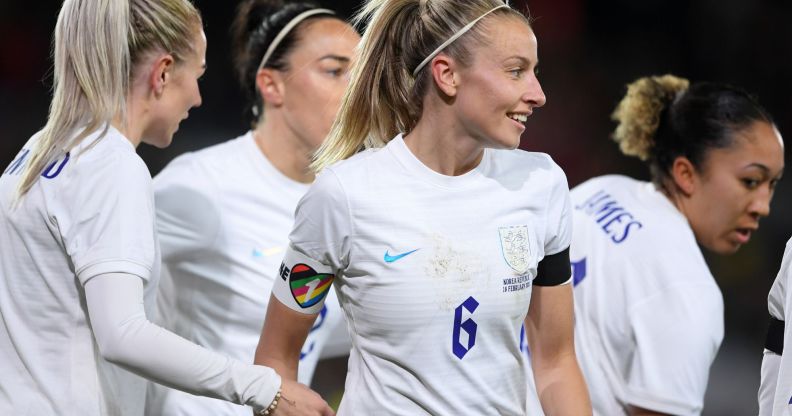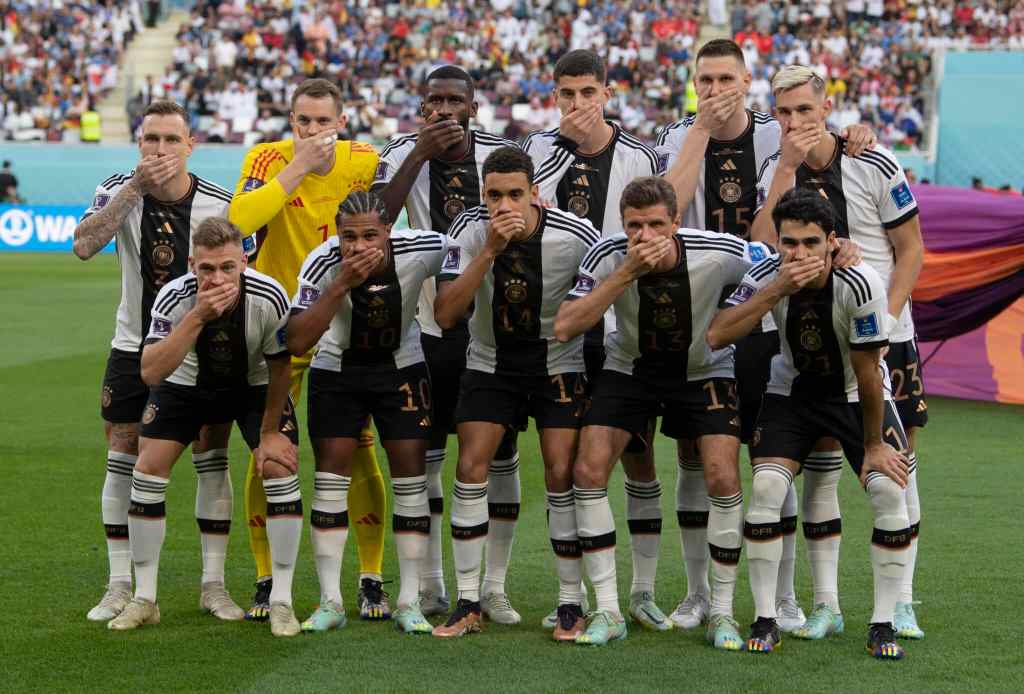Women’s World Cup: FIFA row brewing over pro-LGBTQ+ OneLove armbands

Leah Williamson said it’s important to wear the OneLove armband at the Women’s World Cup to show “solidarity” with Jakub Jankto, who came out as gay. (Getty)
No decision has been made on whether players at the women’s World Cup in July will be permitted to wear the pro-LGBTQ+ OneLove armband, world governing body FIFA has said.
At the men’s World Cup in 2022, held in Qatar, teams were banned from wearing the armband with threats of dissenting players being booked and so risking missing a game later in the tournament.
This was due to the country’s lack of LGBTQ+ rights and extreme views on queer lives.
Ahead of the women’s World Cup, which is being held by Australia and New Zealand from 20 July until 20 August, the German Football Association (FA) has already questioned if the armbands will be permitted at the upcoming event.
A FIFA spokesperson told Sky Sports: “At a team workshop, FIFA was asked about equipment and competition regulations in relation to the 2023 Women’s World Cup.
“FIFA wishes to reiterate that no decision has been taken in relation to armbands [and] remains committed to ongoing dialogue with players and member associations.”
At the men’s tournament in Qatar, where homosexuality is illegal, players and captains were informed that they would face an instant yellow card if they wore any armband not approved by FIFA.
A joint statement at the time from the football associations of England, Wales, Belgium, Denmark, Germany, the Netherlands and Switzerland, read: “FIFA has been very clear that it will impose sporting sanctions if our captains wear the armbands on the field of play.
“As national federations, we can’t put our players in a position where they could face sporting sanctions including bookings, so we have asked the captains not to attempt to wear the armbands in World Cup games.”
The English FA had been prepared to pay a fine to allow captain Harry Kane to wear the armband, but as the tournament got underway on 20 November 2022, it emerged that the skipper would also be booked, a risk the FA didn’t want to take.
The controversy culminated in the German team staging a protest, with their hands over their mouths for a team photo.

The World Cup also saw FIFA reportedly hold “urgent talks” with Qatar after a number of fans, including former Wales captain Laura McAllister, were reportedly asked to remove rainbow items before entering stadiums.
Eventually, FIFA was forced into a u-turn on its attempt to ban rainbow-coloured clothing.
England Lionesses aim to wear pro-LGBTQ+ OneLove armband at Women’s World Cup
England women’s captain Leah Williamson announced in February that the Lionesses want to wear OneLove armbands at the World Cup.
The Lionesses have shown their support for the LGBTQ+ community numerous times, and Williamson wore a rainbow armband as the team triumphed at Euro 2022. The England women’s national team includes several out queer players.
After Czech Republic player Jakub Jankto came out publically as gay, Williamson said it’s “not even a question” for the England women’s national team to show their support by wearing the armbands.
“To stand in solidarity with that is important to us, but it’s something we’ve always done, it’s something we’ll continue to do,” she said.
“[It’s] not just football, we’re trying to have a positive impact on society too and that’s one of the ways we can do that.”
The OneLove campaign – which opposes all forms of discrimination – launched the armbands in 2020 as part of a campaign by footballers in the Netherlands.

